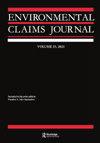一条可持续的前进道路:弥补巴塞尔公约的缺陷和印度的废物管理
Q3 Environmental Science
引用次数: 0
摘要
摘要本研究分析了《巴塞尔公约》和印度的废物管理系统,突出了其中的重要缺陷,并提出了改进建议。它考察了印度的废物管理方法。从迈苏尔、德里、浦那和锡金的成功措施可以看出,废物分类、吸纳非正规工人和减少浪费都至关重要。旧金山、德国、日本和瑞典的例子强调了回收利用、废物转化为能源和健全的政策。该研究为印度提供了建议,并对巴塞尔公约进行了可能的修改,以促进环境友好、经济可行和社会公平的废物管理。披露声明作者未报告潜在的利益冲突。关于贡献者的说明。Arup Kumar Poddar博士是印度加尔各答WB国立法学大学(NUJS)的正教授。他的邮箱Id: [arup.poddar@nujs.edu]。他在国际和国家一级完成了自然资源法和保护相关领域的博士学位。他有21年的教学经验。波达尔教授是《国际法律与政策评论杂志》(2012)[ISSN (O) 2278-3156]和《国际法律研究杂志》(2012)[ISSN (O) 2278-4764]两本国际在线期刊的创始人和主编。曾在印度政府规划委员会(2011)的水资源部门就“地下水资源保护、养护、管理和监管示范法案草案”进行研究工作。2015-16年,他是孟买马哈拉施特拉邦国立法律大学(MNLU)学院委员会成员。他在2010-11年期间担任NUJS的代理注册主任。波达尔教授是南京科技大学技术法律与发展学院(STLD)院长。他是南京大学学术委员会常任委员。本文章由计算机程序翻译,如有差异,请以英文原文为准。
A Sustainable Path Forward: Remedying Flaws in the Basel Convention and India’s Waste Management
AbstractThis research analyses the Basel Convention and India’s waste management systems, highlighting important shortcomings and offering recommendations for enhancement. It takes a look at India’s waste management methods. Waste segregation, incorporating informal workers, and reducing waste are all crucial, as seen by the success of measures in Mysuru, Delhi, Pune, and Sikkim. Recycling, waste-to-energy conversion, and sound policy are highlighted by examples from San Francisco, Germany, Japan, and Sweden. The research provides suggestions for India and possible changes to the Basel Convention to facilitate environmentally friendly, economically viable, and socially equitable waste management. Disclosure statementNo potential conflict of interest was reported by the author(s).Additional informationNotes on contributorsArup Kumar PoddarProf. Dr. Arup Kumar Poddar is a full Professor-in-law at the WB National University of Juridical Sciences (NUJS), Kolkata, India. His email Id: [arup.poddar@nujs.edu]. He has completed Ph.D. in the area connected with Natural Resources Law and Protection at the International and National level. He has a total length of 21 years of teaching experience. Prof. Poddar is the founder and Chief Editor of two online International Journals, they are International Journal of Law and Policy Review, 2012 [ISSN (O) 2278-3156] and International Journal of Legal Studies and Research, 2012 [ISSN (O) 2278-4764]. He has done a research work in the water resource department on “The draft model bill for the protection, conservation, management and regulation of groundwater resources” in the Planning Commission, (2011) Govt. of India. He was the member of the Academy Council of Maharashtra National Law University (MNLU, Mumbai during 2015-16. He was Registrar (Acting) during 2010-11 at NUJS. Prof. Poddar is the Head of the School of Technology Law and Development (STLD) of NUJS. He is the permanent members of Academic Council at NUJS.
求助全文
通过发布文献求助,成功后即可免费获取论文全文。
去求助
来源期刊

Environmental Claims Journal
Environmental Science-Management, Monitoring, Policy and Law
CiteScore
2.20
自引率
0.00%
发文量
10
期刊介绍:
The Environmental Claims Journal is a quarterly journal that focuses on the many types of claims and liabilities that result from environmental exposures. The ECJ considers environmental claims under older business insurance policies, coverage and claims under more recent environmental insurance policies, as well as toxic tort claims. Exposures and claims from all environmental media are considered: air, drinking water, groundwater, soil, chemicals in commerce and naturally occurring chemicals. The journal also considers the laws, regulations, and case law that form the basis for claims. The journal would be of interest to environmental and insurance attorneys, insurance professionals, claims professionals, and environmental consultants.
 求助内容:
求助内容: 应助结果提醒方式:
应助结果提醒方式:


